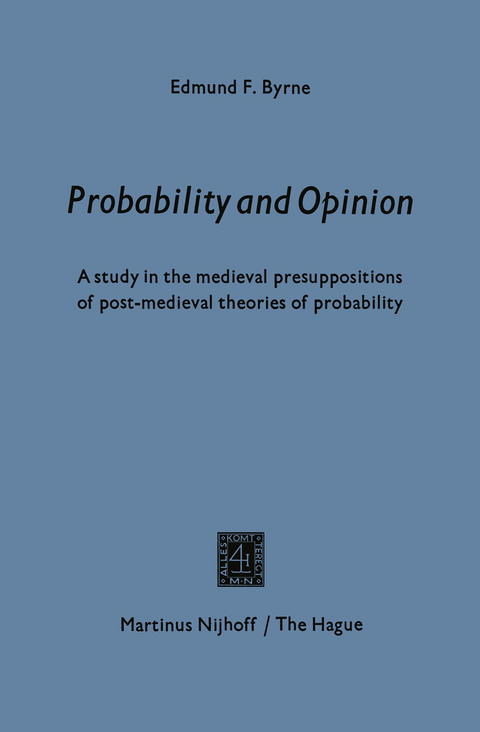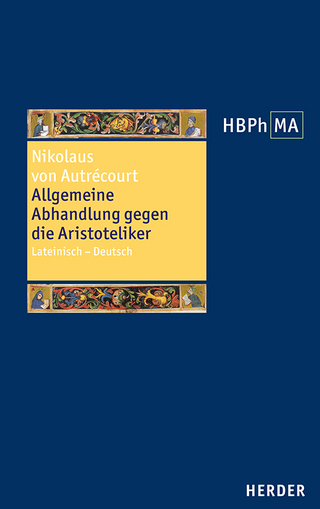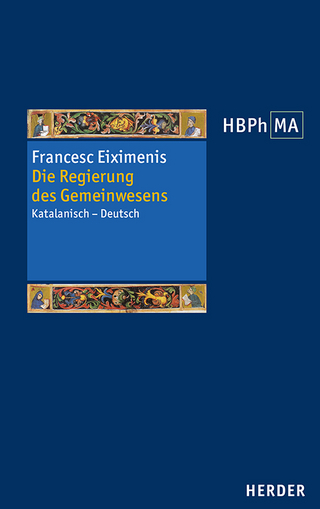
Probability and opinion
A Study in the Medieval Presuppositions of Post-Medieval Theories of Probability
Seiten
1968
Springer (Verlag)
978-94-015-0295-5 (ISBN)
Springer (Verlag)
978-94-015-0295-5 (ISBN)
The set of those results constitutes effectively a set of possibilities, relative to a phenomenon of a certain type, the fall of the die in specified circumstances. the set of those velocities constitutes effectively a set of possible values which a physical property, namely the velocity of a molecule, can have.
Modern physics has accustomed us to consider events which cannot give rise to certainty in our knowledge. A scientific knowledge of such events is nevertheless possible. The method which has enabled us to obtain a stable and exact knowledge about uncertain events consists in a kind of changing of plane and in the replacing of the study of indi vidual phenomena by the study of statistical aggregates to which those phenomena can give rise. A statistical aggregate is not a collection of real phenomena, among which some would happen more often, others more rarely. It is a set of possibilities relative to a certain object or to a certain type of phenomenon. For example, we could consider the differ ent ways in which a die, thrown in given conditions, can fall: they are the possible results of a certain trial, the casting of the die (in the fore seen conditions). The set of those results constitutes effectively a set of possibilities, relative to a phenomenon of a certain type, the fall of the die in specified circumstances. Similarly, it is possible to consider the different velocities which can affect a molecule in a volume of gas; the set of those velocities constitutes effectively a set of possible values which a physical property, namely the velocity of a molecule, can have.
Modern physics has accustomed us to consider events which cannot give rise to certainty in our knowledge. A scientific knowledge of such events is nevertheless possible. The method which has enabled us to obtain a stable and exact knowledge about uncertain events consists in a kind of changing of plane and in the replacing of the study of indi vidual phenomena by the study of statistical aggregates to which those phenomena can give rise. A statistical aggregate is not a collection of real phenomena, among which some would happen more often, others more rarely. It is a set of possibilities relative to a certain object or to a certain type of phenomenon. For example, we could consider the differ ent ways in which a die, thrown in given conditions, can fall: they are the possible results of a certain trial, the casting of the die (in the fore seen conditions). The set of those results constitutes effectively a set of possibilities, relative to a phenomenon of a certain type, the fall of the die in specified circumstances. Similarly, it is possible to consider the different velocities which can affect a molecule in a volume of gas; the set of those velocities constitutes effectively a set of possible values which a physical property, namely the velocity of a molecule, can have.
one Modern Notions of Probability.- I: Some Modern Views on Probability.- Two A Medieval Notion of Probability.- II: Opinion, Error, and Human Imperfection.- III: Tradition as a Source of Opinion and Probability.- IV: Probability in Disputation and Demonstration.- V: The Quasi-Mathematics of Truth: Semper and Some of the Time.- VI: Thomas’s Theocentric Perspective on Probability.- Conclusion: On the Historical Dimension of “Probability”.- Selected Bibliography.
| Zusatzinfo | 2 Illustrations, black and white; XXX, 334 p. 2 illus. |
|---|---|
| Verlagsort | Dordrecht |
| Sprache | englisch |
| Maße | 155 x 235 mm |
| Themenwelt | Geisteswissenschaften ► Philosophie ► Philosophie des Mittelalters |
| Mathematik / Informatik ► Mathematik ► Wahrscheinlichkeit / Kombinatorik | |
| Naturwissenschaften | |
| ISBN-10 | 94-015-0295-1 / 9401502951 |
| ISBN-13 | 978-94-015-0295-5 / 9789401502955 |
| Zustand | Neuware |
| Haben Sie eine Frage zum Produkt? |
Mehr entdecken
aus dem Bereich
aus dem Bereich
Buch | Softcover (2024)
Reclam (Verlag)
CHF 11,90
Lateinisch - Deutsch
Buch | Hardcover (2024)
Herder (Verlag)
CHF 97,95


